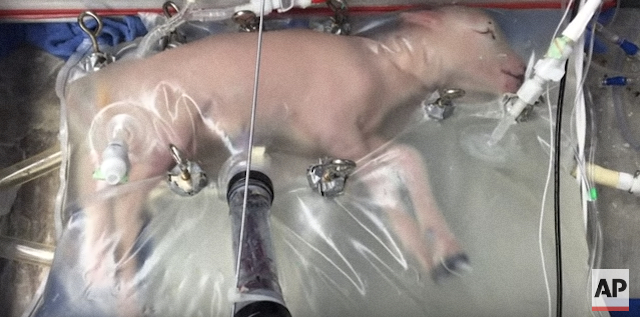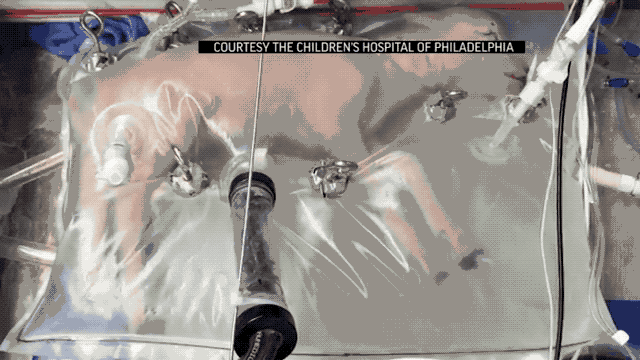Scientists Created an Artificial Womb, and Also Maybe the Singularity Is Near


Doctors at the Children’s Hospital of Philadelphia fashioned a plastic artificial womb that has successfully kept a premature baby lamb alive for four weeks. It has the potential to do a whole lot more.
This story and the accompanying imagery seem straight out of science fiction but it’s all science fact, my friends. The “Biobag” womb was developed with the idea that it could one day be adapted for use by human babies. Premature births account for the highest rate of infant mortality, and premature babies that survive are often subject to health complications. In theory, the womb could create an environment where babies could develop further while under medical observation. Here’s how it works:
The sealed bag, made of polythene, contains amniotic fluid to provide all the nutrients and protection needed for growth, an interface delivering oxygen just as an umbilical cord would, and exchanging gases just like a placenta.
This is ingenious and incredible and also feels like so many themes in futuristic stories and media I’ve consumed that I’m kind of freaking out. Of course, there are few endeavors more laudable than saving premature babies, and I hope this technology is developed at top speed (the doctors involved estimate it could take about a decade before the tech is ready for humans). I guess the possible implications just feel … enormous. Much bigger than this little lamb.
While the Biobag has been created with an eye towards helping premature babies—presumably those already born or possibly those who would be surgically removed because they are at greater risk or causing complications to the mother—it’s easy for my genre-saturated brain to leap ahead and conceive of artificial wombs that would allow the whole process of childbirth to skip the woman’s involvement.
It’s worth noting that the lead scientist in charge of research would tell me to calm the hell down. Per the Verge:
It’s important not to get ahead of the data, says Alan Flake, fetal surgeon at the Children’s Hospital of Philadelphia and lead author of today’s study. “It’s complete science fiction to think that you can take an embryo and get it through the early developmental process and put it on our machine without the mother being the critical element.
OK, thank you Dr. Flake, and thank you for your groundbreaking work. But I’m predicting into the science fiction future here. A lady’s gotta speculate when she loves speculative works.
The possibilities and ramifications therein are endless in terms of reproductive rights battles, infertility, surrogacy, maternal death rates, adoption—I could go on pretty much forever. If you could grow your baby in an artificial environment under ideal circumstances, would women choose to give birth naturally anymore? Would this become another province of the wealthy, already a concern in countries where surrogacy “farms” are the rise and childbirth is being “outsourced”? Would there come to be a cultural divide and battles between “old-fashioned” vs. “artificial” births? So many questions. BRB I’m pitching this TV show to Syfy.
This is the kind of technology that has the potential to completely change the world. In my headline I jokingly referenced the Singularity, of which there are many proposed kinds, but I was thinking seriously about mathematician and physicist John von Neumann’s prediction of what that meant: “the ever accelerating progress of technology … gives the appearance of approaching some essential singularity in the history of the race beyond which human affairs, as we know them, could not continue.”
That sounds dire! But von Neumann also defined the Singularity as the moment after which “technological progress will become incomprehensively rapid and complicated.” We usually consider this to be in terms of the development of A.I., but the eventual introduction of artificial wombs—which now seems closer to reality than ever before—would certainly rapidly complicate human affairs as we know them. What comes after is anyone’s guess.
(via CNN, images: The Children’s Hospital of Philadelphia via screengrab, video via Futurism)
Want more stories like this? Become a subscriber and support the site!
—The Mary Sue has a strict comment policy that forbids, but is not limited to, personal insults toward anyone, hate speech, and trolling.—
Have a tip we should know? [email protected]
